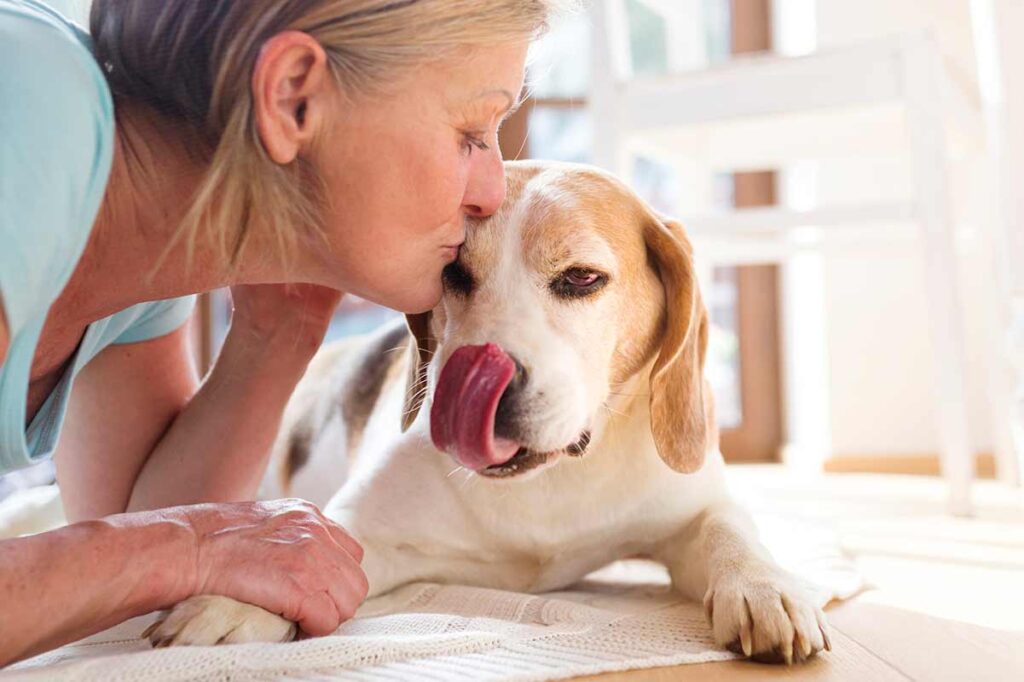
Parvovirus is often thought of as a puppy issue. While puppies are the most commonly and hardest hit age group of dogs when it comes to parvo, adults and senior dogs can also get parvo. This is especially true if a dog is unvaccinated. Let’s get into parvo symptoms in adult and senior dogs, and what can be done to treat and prevent it.
What Is Parvo?
Parvo is a very dangerous contagious disease caused by parvovirus. It can be transmitted from one dog to another through direct contact and through contact with contaminated feces. Parvovirus can survive for several months in the environment if the surrounding temperature and conditions are right. The virus can also be shed in a dog’s feces before any signs are seen and for up to eight weeks after they get better.
Since parvovirus is everywhere, it can be very hard to prevent exposure. This is especially true if your dog goes to the dog park or other areas where other dogs frequent. Instead, you can protect your dog from parvo by proper vaccination. This includes a series of “puppy shots” as well as boosters every one to three years for adults and seniors.
Parvo and Older Dogs
Parvo most commonly affects puppies since their immune system is still developing. However, older dogs aren’t immune completely. They can still get parvo from puppies or other infected dogs if they aren’t fully vaccinated or if they have a health condition that compromises their immune system.
Older dogs can come in contact with infected dogs or feces in your own backyard, park, or any hiking or walking trail that sees other dogs. The virus can also be carried on people’s hands and clothes, kennel surfaces, and paws and fur. It is a hearty virus that requires a bleach disinfection solution to rid from surfaces.
While not nearly as common in adults as it is in puppies, any age dog can contract parvo if they aren’t up-to-date on vaccinations.
Parvo Symptoms in Older Dogs
The parvovirus attacks the cells that line the intestine of a dog, affecting how well the gut absorbs water and nutrients. It also attacks bone marrow, decreasing the number of white blood cells that are made. Both of these issues can cause some pretty severe signs.
- Lethargy and not wanting to eat: Often, the first sign that you may see of parvo in an older dog is lethargy and not wanting to eat.
- Fever, vomiting, or diarrhea: That may then progress to fever, vomiting, and diarrhea, often with a strong smell. There is a distinct metallic smell to feces infected with parvovirus. The poop contains the shedded lining of the intestines and blood, which creates the horrible smell. Additionally, it can smell slightly sweet or rotten. The smell of Parvo poop is unique. Read our article “What does Parvo smells like?” to learn more.
- Blood in diarrhea or blood in vomit: Diarrhea and vomit may also contain blood.
- Dehydration and starvation: Eventually, parvo leads to dehydration and starvation because the digestive system can’t absorb enough water or nutrients and lots of fluid is lost through diarrhea and vomiting. The decrease in white blood cell production also inhibits the immune system so that it can’t fight off the virus as effectively. All of this can lead to shock, organ failure, and death.
More severe cases seem to occur in dogs that have other health conditions, such as diabetes, chronic digestive diseases, or kidney disease. Parvo also affects unvaccinated animals harder.
Dogs that die from parvo typically die of dehydration or shock.
Parvo Symptoms Treatment in Adult and Senior Dogs
Parvo symptoms can come on very quickly and rapidly become severe. Because of this, it’s very important to get treatment as soon as possible. Only the most mild cases will respond to home treatments; the majority of dogs with parvo are going to need veterinary care.
Parvo symptoms home treatment
If you suspect that your dog has parvo, contact your veterinarian. If they have a mild case, home treatment may be successful, but your veterinarian should be informed so that you can follow their advice.
Home treatments revolve around preventing dehydration by pushing fluids. This can be difficult if your dog is vomiting or not wanting to eat. You may entice them to drink more by giving adding a little low-sodium chicken broth or low-sugar electrolyte solution to their water. You may also try making a slurry of canned food by adding water until it is a tomato soup consistency.
Monitor your dog for signs of dehydration, including sticky, dry gums, skin that tents when you pinch it, or sunken eyes. Withhold food to help prevent vomiting. If your dog appears at all dehydrated or you can’t decrease their vomiting, see your veterinarian immediately.
Parvo symptoms veterinary treatment
Your vet will try to correct dehydration by giving intravenous fluids. They may also give your dog an anti-nausea medication to decrease vomiting and antibiotics to help prevent a secondary infection. Depending on the severity, your dog may end up spending multiple nights in the hospital. Once a dog has stopped vomiting and is willing to eat, he will be fed an easily digestible diet in small, frequent meals throughout the day. They will be given fluids until they are able to drink enough water to stay hydrated.
Parvo can be expensive to treat since it may take several days to get very sick dogs stable. Expect to pay anywhere from $200-$2,000, or more, depending on how long they have to stay in the hospital.
Preventing Parvo in Senior Dogs
The best way to prevent parvo in any age group of dogs is with proper vaccination. This includes the puppy shots and then a booster every one to three years following that. Not keeping your older dog up-to-date with these boosters puts them back into the moderate to high risk category for a parvovirus infection.
You can also try to prevent exposure by keeping your older dog away from dog parks or other areas that other dogs go. Keep them away from neighborhood dogs by fencing your yard and don’t let your dog visit a friend’s dog that is unvaccinated. Always wash your hands after petting or cleaning up after a sick dog or a dog that you don’t know.
For puppies, keep them away from other dogs as much as possible until they receive their full series of puppy shots. The vaccine won’t fully guarantee that your dog will be completely protected from parvo but will provide significant protection and reduce risks of infection.
Frequently Asked Questions
At what age is a dog safe from parvo?
Age doesn’t have anything to do with being safe from parvo. Rather, whether or not your dog is vaccinated will be a greater determiner if your dog gets parvo or not.
Can an elderly dog get parvo?
Dogs of any age can get parvo. Young puppies, unvaccinated dogs, and dogs with a weakened immune system are most at risk. If an elderly dog has been kept up-to-date on vaccinations and is otherwise healthy, they have less chance of developing a severe case of parvo.
Can older dogs get parvo even if vaccinated?
Proper vaccination is the best way to prevent parvo, however it isn’t 100% effective at keeping dogs from getting the disease. However, vaccinated dogs typically develop only a mild case instead of a more severe or life-threatening illness.
How long does it take for parvo to kill a dog? How long can a dog live with untreated parvo symptoms?
Parvo cases can vary greatly in severity. Mildly affected dogs might not even show signs, while more severe cases can cause serious dehydration that can kill a dog within a couple of days.
Do older dogs have a better chance of surviving parvo symptoms?
Older dogs generally have less severe cases of parvo because their immune system is fully developed and more capable of handling the infection. Being up-to-date on vaccinations will also help a dog combat a parvo infection.
What breeds of dogs are more prone to parvo?
Rottweilers, Doberman Pinschers, Staffordshire Terriers, German Shepherds, and Labrador Retreivers seem to be more prone to parvo. Cross-breed dogs, or mixes, tend to be less prone.
Can cats or humans get parvo from dogs?
Parvovirus is species-specific, which means that it doesn’t cross species. However, there is a type of parvovirus that infects cats, called feline panleukopenia. Canine parvovirus can sometimes infect cats, but it generally only causes very mild signs. Humans also can get a form of parvovirus that is specific to humans. They can’t get parvo from their dog.
Can an old dog get parvo twice?
Once a dog has parvo, they usually develop immunity that can last for years. However, old dogs that have a weakened immune system might not develop that immunity.
Related Article:


